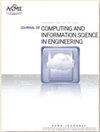Hybrid Cost-Tolerance Allocation and Production Strategy Selection for Complex Mechanisms: Simulation and Surrogate Built-In Optimization Models
IF 2.6
3区 工程技术
Q2 COMPUTER SCIENCE, INTERDISCIPLINARY APPLICATIONS
Journal of Computing and Information Science in Engineering
Pub Date : 2023-01-17
DOI:10.1115/1.4056687
引用次数: 3
Abstract
In manufacturing companies, assembly is an essential process to obtain the final product. The life cycle of an assembly product depends on various production strategies, e.g., resource allocation, rework decision, selection strategy, etc. In this regard, achieving a reliable assembly product commence with engineering a comprehensive design plan which can mitigate various uncertainties a company can face. The counteraction of uncertainties can be altered by introducing a set of tolerances into components design. Tolerances define a practical margin on components design without downgrading the required performance of products. Thus, producers are confronted with high-quality requirements, cost pressure, and a rising number of demands. On these bases, this paper aims at modeling a statistical framework for a set of production strategies, including resource allocation (as a decision to assign practical resources to components) and reworking decision (as a decision to improve components conformity rate). Moreover, a generic simulation and surrogate approach is established to evaluate the performance of the assembled product. Within this approach, simulation and surrogate models can be used to investigate a variety of deviation over components geometries within the process deviation domain and deploy reworking decision. Ultimately, a modular costing system is developed, and a genetic algorithm is adapted to locate optimal solutions. In addition, the applicability of the statistical model is studied on an assembly product.复杂机构的混合成本容忍分配与生产策略选择:仿真与代理内建优化模型
在制造企业中,装配是获得最终产品的重要过程。装配产品的生命周期取决于各种生产策略,如资源分配、返工决策、选择策略等。在这方面,实现可靠的装配产品始于工程一个全面的设计计划,可以减轻公司可能面临的各种不确定性。不确定性的抵消可以通过在部件设计中引入一套公差来改变。公差定义了在不降低产品性能要求的情况下,元件设计的实际余量。因此,生产商面临着高质量的要求、成本压力和越来越多的需求。在此基础上,本文旨在建立一套生产策略的统计框架,包括资源分配(作为将实际资源分配给组件的决策)和返工决策(作为提高组件合格率的决策)。此外,建立了一种通用的仿真和替代方法来评估装配产品的性能。在这种方法中,可以使用模拟和代理模型来研究过程偏差域中组件几何上的各种偏差,并部署返工决策。最后,开发了一个模块化的成本计算系统,并采用遗传算法来定位最优解。此外,还研究了统计模型在装配产品上的适用性。
本文章由计算机程序翻译,如有差异,请以英文原文为准。
求助全文
约1分钟内获得全文
求助全文
来源期刊
CiteScore
6.30
自引率
12.90%
发文量
100
审稿时长
6 months
期刊介绍:
The ASME Journal of Computing and Information Science in Engineering (JCISE) publishes articles related to Algorithms, Computational Methods, Computing Infrastructure, Computer-Interpretable Representations, Human-Computer Interfaces, Information Science, and/or System Architectures that aim to improve some aspect of product and system lifecycle (e.g., design, manufacturing, operation, maintenance, disposal, recycling etc.). Applications considered in JCISE manuscripts should be relevant to the mechanical engineering discipline. Papers can be focused on fundamental research leading to new methods, or adaptation of existing methods for new applications.
Scope: Advanced Computing Infrastructure; Artificial Intelligence; Big Data and Analytics; Collaborative Design; Computer Aided Design; Computer Aided Engineering; Computer Aided Manufacturing; Computational Foundations for Additive Manufacturing; Computational Foundations for Engineering Optimization; Computational Geometry; Computational Metrology; Computational Synthesis; Conceptual Design; Cybermanufacturing; Cyber Physical Security for Factories; Cyber Physical System Design and Operation; Data-Driven Engineering Applications; Engineering Informatics; Geometric Reasoning; GPU Computing for Design and Manufacturing; Human Computer Interfaces/Interactions; Industrial Internet of Things; Knowledge Engineering; Information Management; Inverse Methods for Engineering Applications; Machine Learning for Engineering Applications; Manufacturing Planning; Manufacturing Automation; Model-based Systems Engineering; Multiphysics Modeling and Simulation; Multiscale Modeling and Simulation; Multidisciplinary Optimization; Physics-Based Simulations; Process Modeling for Engineering Applications; Qualification, Verification and Validation of Computational Models; Symbolic Computing for Engineering Applications; Tolerance Modeling; Topology and Shape Optimization; Virtual and Augmented Reality Environments; Virtual Prototyping

 求助内容:
求助内容: 应助结果提醒方式:
应助结果提醒方式:


